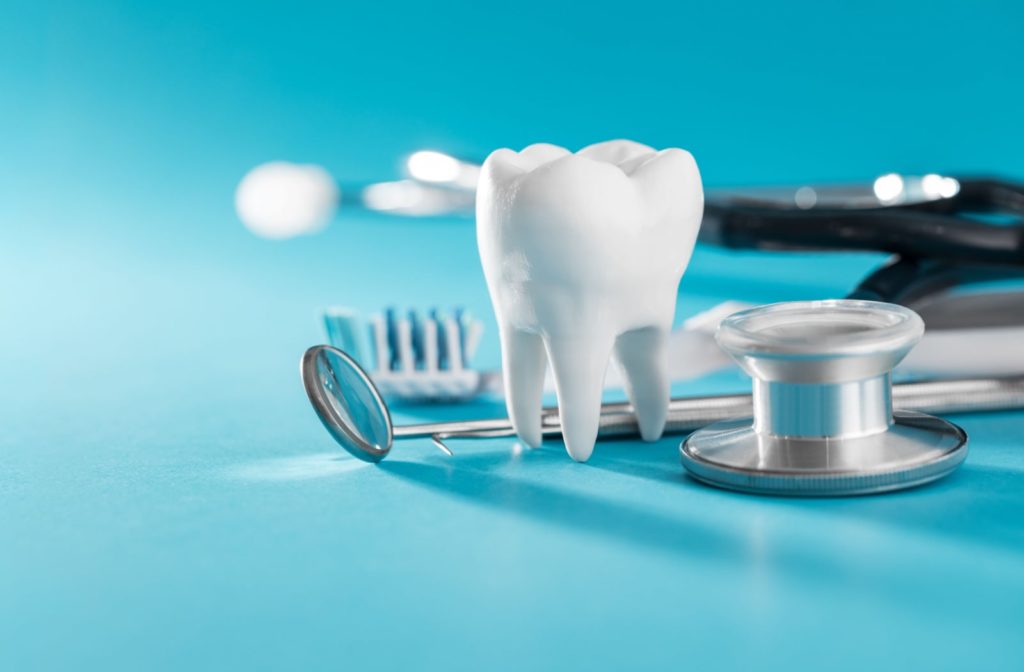What Is a Dental Bone Graft?
A dental bone graft is a procedure performed by a dental surgeon to address issues related to insufficient bone mass in the jaw and may be required for a dental implant. A dentist may also recommend a bone graft as a part of preventive dental care—to help strengthen a jaw affected by missing teeth or gum disease.
When a dentist recommends a dental implant to replace missing teeth, they will also check your jawbone to confirm it is healthy and strong enough to support an implant. If the results of your dental exam show your jawbone is not strong enough, your dentist may recommend a dental bone graft to provide more support for your implant.
What Is a Dental Implant?
A dental implant can be a durable solution for replacing missing teeth. Essentially, it is a small, titanium post surgically inserted into your jawbone beneath your gum line. This titanium post is a substitute for the root of a missing natural tooth.
With the titanium post in place, a custom artificial tooth can be created and inserted to support your surrounding teeth and prevent gum recession. A dental implant can also help address changes to your face related to tooth loss.
How Does Getting a Dental Implant Work?
The process of getting a dental implant involves several stages. First, an exam will be performed to determine if an implant is right for you and whether you may need a dental bone graft.
After your initial exam—and bone graft if necessary—the titanium post is inserted into your jaw through a surgical procedure. Over time, a natural process called osseointegration occurs, during which the post fuses with the surrounding bone, providing a stable foundation for the replacement tooth.
Once osseointegration is complete, the next stage involves attaching an abutment, a connector piece, to the implant. The abutment will connect the implant and the artificial tooth, such as a crown or bridge. The final stage involves the placement of the custom-made artificial tooth onto the abutment.
If you have healthy gums and enough bone in your jaw to support a dental implant, you may be a good candidate. If you do not have enough bone in your jaw, a bone graft can help build up the support needed for a dental implant procedure.
When Do You Need a Dental Bone Graft?
You may need a dental bone graft to prepare your jaw for an implant. If your jawbone is soft or not thick enough, it may not be able to support a dental implant, and an implant procedure could fail.
In some cases, a bone graft may also be recommended for people whose jaw has weakened because of other issues, such as:
- Tooth loss
- Gum disease
- Osteoporosis
- Jaw injuries
- Damage caused by infections
Types of Dental Bone Grafts
Bone grafting involves taking bone material from another part of the body, a donor, or a synthetic source and placing it in the targeted area of the jaw. Over several months, the graft integrates with the existing bone, promoting regeneration and strengthening the jaw structure.
There are 4 types of dental bone grafts. They vary depending on the source of the new material for your jaw:
- Autografts use bone material from your own body, often sourced from the hip or another part of the jaw.
- Allografts involve using bone material from a donor source.
- Xenografts use bone material from other sources, such as a cow, pig, or even coral.
- Alloplastic grafts use synthetic materials such as calcium phosphate or calcium sodium phosphosilicate

Why Get a Dental Bone Graft?
The most important reasons to get a dental bone graft include restoring and stabilizing your mouth and jaw from tooth loss, gum disease, or bone loss.
Support for Dental Implants
Successful procedures for dental implants require a solid foundation in your jaw, which a dental bone graft can provide by creating sufficient bone mass to support the implant.
Support for Your Jaw’s Structure
Tooth loss, gum disease, and trauma can lead to bone loss, resulting in a weakened jaw structure. Bone grafts can prevent further deterioration and preserve jawbone integrity to help maintain your facial aesthetics and oral health.
Enhanced Denture Stability
A dental bone graft can improve the stability and fit of dentures. By providing additional support, a bone graft could reduce the risk of denture slippage and discomfort.
Restored Facial Contours
The loss of bone mass in the jaw can lead to changes in facial appearance, including sagging and a prematurely aged look. Bone grafting can help restore and maintain facial contours to your face.
What Are the Benefits of Dental Bone Grafts?
The benefits of a dental bone graft can vary based on your existing oral health, but in general, they can help support your jaw and mouth by preventing future issues. They can also help provide additional options for supporting your teeth and smile, such as dental implants.
Improved Oral Function
Dental bone grafts can contribute to the restoration of proper oral function by providing a stable foundation for dental prosthetics. Bone grafts may also enhance chewing efficiency and overall bite strength.
Enhanced Smile
Beyond functional benefits, bone grafts can play a role in improving your smile. By preserving jawbone structure, grafting can support the natural alignment of your teeth and offer support for implants to help create a smile you love.
Long-term Oral Health Support
Dental bone grafts can contribute to your long-term oral health by preventing further bone loss and maintaining the stability of dental prosthetics. This proactive approach can help you avoid future complications and the need for additional dental procedures.
Let’s Talk About Dental Bone Grafts & Implants
A dental bone graft is a procedure that can offer hope to individuals with insufficient bone mass to support dental implants. The procedure may also be essential for supporting your long-term dental health.
If you have missing teeth or are concerned about your jawbone health, book an appointment with us. At Dentistry on Danforth, we are ready to help you determine the right approach for addressing missing teeth based on your needs and preferences.


